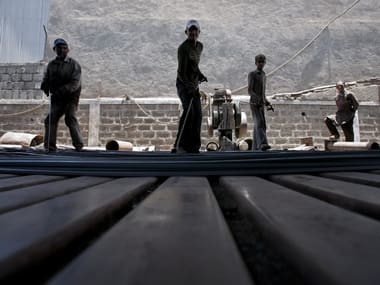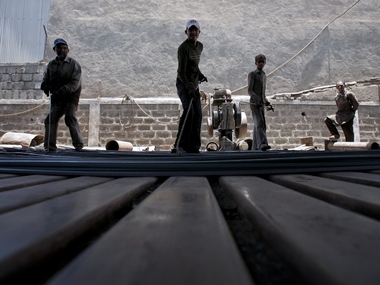The IIP numbers, a contraction of 5.1 percent, shocked laymen and investors alike. But a 25 percent decline in capital goods - the biggest fall in the last two years - was even more disappointing.
And the situation is not going to get better any time soon. Power boiler and turbine orders, which make up almost a fifth of the economy’s capex, have slowed down and will grow at a snail’s pace for the next two to three years. The 12th Plan orders have just been awarded. So the 13th Plan orders are unlikely to be placed in the next couple of years.
[caption id=“attachment_155593” align=“alignleft” width=“380” caption=“Reuters”]
 [/caption]
[/caption]
What has been bothering the domestic players even more is competition from Chinese players. The industry lobby has been fighting for an import duty on Chinese manufacturers for a long time. The government yesterday floated a Cabinet note passing a 14 percent import duty on Chinese power equipments. The heavy industry companies like BHEL and L&T are evidently not happy as they want a minimum 19 percent duty to give them a level-playing field.
Two points are to be looked at here:
First, why do Indian power generation companies prefer Chinese manufacturers; and two, will the import duty help?
Credit Suisse sums up how the Chinese manufacturers have an edge over Indian peers. First, Chinese equipment is 15-20 percent cheaper than NTPC’s bulk tender bids. And they could cut prices further as some Chinese players earn around 100-200bps (100bps=1 percent) higher margins in India than they do back home.
Second issue is delivery timelines. Chinese equipment manufacturers are able to deliver sub-critical equipment in 22-28 months and super-critical equipment (660 MW sets) in 39-42 months versus 36-39 months required by BHEL for subcritical equipments and 45-48 months required for super-critical equipment.
Impact Shorts
More ShortsThe third problem is financing. Chinese banks, especially the China EXIM bank, provide cheaper loans for power equipment if it is sourced through Chinese suppliers. Contrast this to Indian banks that are getting increasingly stringent on lending to power sector due to fuel linkage issues and execution problems.
AM Naik, chairman and managing director, L&T explained in an interview to CNBC TV 18, “When you look at for what trickles in for the power industry, most of it gets imported from China because of that 30 percent indirect subsidy on account of managed currency. There also is the indirect subsidy of 10-12 percent and on top of that we have Indian taxes of 11-12 percent. So now you have a gap of 54-55 percent, due to which Indian power equipment manufacturers do not have work.”
So will the proposed import duty on Chinese manufacturers help? An analyst with Fortune Equity Brokers tells Firstpost, “The 14 percent or 19 percent duty will be of no help as it is too late. There are enough manufacturing capacities in domestic players as well. With most of the 12th Plan orders already being placed, order inflow will be really slow. And with so few orders left for huge capacities, pricing war is imminent.”
Hence, BHEL is taking its capacity to 20,000 MW while L&T just added another 4,000 MW. And all this when power project orders are few.
With capacity utilisation crucial for these players, they would perhaps compromise on margins to bag orders. Barclays also writes, “The stage is set for margin pressure to become more evident as some of the key end markets are going through a phase of hyper-competition.”
This explains the negative view most brokerages have on the capital goods sector. While Credit Suisse has a target price of Rs 227 for BHEL (current price Rs 260), Barclays initiated coverage with a neutral view and expects BHEL, Thermax and BGR Energy to underperform. Going by the pessimism among investors, the pain for Indian heavy industries may just have started.
)